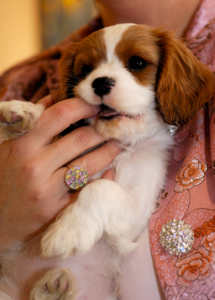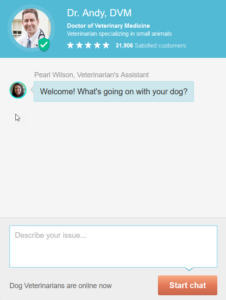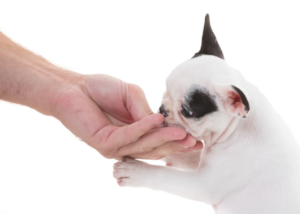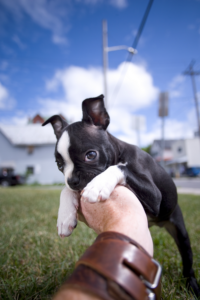Do you have a puppy, and you wonder about its biting behavior? If yes, you don’t have to worry anymore as this guide will enlighten you about dog biting, how to deal with the situation, and any other crucial information you ought to know. Note that during the early stage of your puppy, they have tiny teeth that are attractive, and others may also enjoy playing with them. It is at this stage the puppy develops a habit of play biting.
Though this habit can be worsened or eliminated during this period, remember that it is normal for a puppy to play through their teeth with you. However, it would be best to do something like training to grow with manners and hinder your puppy from carrying the behavior to adulthood. Now let dive further and explore more about dog biting.
10 Main Reasons Why Puppies Bite

Though puppies are cute, soft, and playful, they can sometimes be bitey. The biting usually is at its early stage, but there are many other reasons that can be a cause of puppy biting. However, the biting from the puppy is not the one that is meant to cause harm to you, but because of the sharp teeth, they can also hurt you.
During puppyhood, there is a certain level of biting or mounting that you can view as usual, but when it goes beyond a certain level, you have to devise ways to curb the behavior. Here in this section, you will explore ten main reasons why puppies bite. Now let’s look at them.
1. Tiredness
Suppose your puppy keeps biting; this might be one of the main reasons it overly exhibits this behavior. Like human babies, your puppy has to get enough sleep because when they get tired and do not get enough time to rest, they can develop unusual behavior like biting.
2. Overexcited
Overexcited is one of the reasons that can cause your puppy to keep on biting. Once they are in emotional arousal, they can use biting to express themselves. Here, they lose self-control, and then they can behave anyhow. However, you should understand your puppy well so that despite the over-excitement, they will not have the dog biting behavior.
3. Frustration
Just like young children have the desire to kick, hit, slap when they are frustrated the same way when the puppies are frustrated, they display this condition through their teeth. You can know if your puppy is frustrated if you view their behavior. Once they have this condition, they have destructive emotions, and they can feel confused or lose their self-control and portray the situation through biting.
4. Bad Training
Most people reinforce the dog biting behavior through lousy training. Other people can take their puppy and start playing with their teeth or curling their fingers on the month of the puppy. You may hear others telling their puppy to bite me, which may lead to your puppy keeping biting.

There are many training activities that you can do to your puppy that will initiate the puppy to this behavior. For example, if you sit with your puppy for a long period and start pulling their nose, hair, ears, and many others, the dog can respond to what you are doing through biting.
5. Not Giving Them Enough Time To Rest
Some people pet their puppy 24/7. It is a bad habit that you should not develop with your puppy. At least you have to give them ample time also to rest. For other puppies, when you pet them for a long period, then they can get overstimulated, and then they can start scratching or biting you. However, you can at least give them a break to also rest.
6. Development Stage
During the development stage of a puppy, there is some period where the dog starts teething, and they will naturally develop different habits like mounting and biting. It is one major cause of puppy biting. You will see them try to grab something and start to chew at this stage.
Even if you try to give them your fingers, they will try to chew them. Note that this behavior comes naturally and can bite you even if you are not frustrated, overstimulated, sleepy, or in other unfavorable conditions.
7. Playing
One of the other ways that a puppy used to play is biting. For example, if you have more than one puppy, sometimes you may see them chasing each other and biting each other. It is a behavior where it can also be applied to you. Your puppy can start playing with you either through biting or mounting.
Note that this is not a real bit but a light one to engage with you during the playing period. Though it is natural how a puppy can play with each other when you only have one puppy, the puppy can engage with you through biting while playing.
8. Pain
One of the other causes of puppy biting is pain. When your puppy is stressed, sick, have injuries, and much other pain, they can develop the biting habit. For example, if your puppies have an injury and you are trying to lift her, then if they experience some pain, they can try to bite you so that you can realize them.
Remember, the puppy can just give you a play-biting to scare you to leave them during this time. However, if you continue holding them, they experience more pain and bite you.
9. Protecting Or Guarding
When the puppy is not trained with things, like toys or chewing, then if you later introduce these things, they may bite because they feel the toy you have given them can harm them. Therefore out of fear, they will bit to guard or protect themselves.
Note that if you train your puppy well, it reaches a time they know what danger is and what is safe; therefore, if the puppy is exposed to danger like not treating them well, then they might bite you real.
10. Fear
Most aggressive behavior, like actual puppy biting, results from fear. When the puppy is fearful of a specific condition, place, or even people, they may become aggressive. Once they get afraid of anything, they can counterattack to respond through biting. Therefore fear is one of the significant reasons that may influence your puppies to develop dog biting behavior.
When a puppy bites a specific hand, leg, a finger can mean certain things to the dog.
The area the puppy bites has several meanings.
In short, this is one way of communication with you. Remember that, for example, hand biting is not a method of attack; however it is an expression that your dog is excited about. That way, you may find on many occasions when you are away then your dog might mount or jump on you, but his target is your hands.

For the finger, the puppy also passes some information through this method.
When you see your puppy try to bite your finger, this is a method to invite you to play biting. It is how natural a puppy would want to play with you, and it is not aggressive; however, others may see this as bad behavior.
Biting the legs has several meanings. For example, in terms of guarding and protecting, the puppy may respond by attacking your legs. However, the other way round, if they bite their legs, they seek some attention because there might be something happening to their bodies, such as ticks or fleas infestation on their body.
Why Would He Be Biting A Specific Part Of The Body?
Puppy biting is specifically to a given part of the body because this is the way your dog tries to communicate with you. The dog might be excited, and they can express this by biting on your hand but playful. The dog might want to invite you into a play, but he can use biting to get your attention. Also, when they are guarding themselves, they are not biting any part of the body but mostly the leg. Therefore being aware of what these bites mean would be an excellent idea for better communication.
What To Do When Puppy Keeps Biting You?

There are other situations where you try to address the dog biting behavior, but it reaches a time when the puppy keeps on biting no matter what you try to do.

If you do not address this issue early, then when it grows old, it might have this behavior that will not be safe for you or others. Here are some of the things you can do when your puppy keeps biting you;
• Don’t punish the puppy
If they see this behavior is persisting, others will be tempted to punish the puppy. But punishing the dog may lead to confusion or worsen the situation because the puppy may not view it as a correct measure, but it is like you don’t like your puppy again, so the puppy can even fight back. Natural dogs respond with a bite whenever they are in a discomfort or displeasure situation.
• Setting up for success
Everyone trains their dogs, but others train them wrongly. Remember that a dog is an individual who has a natural behavior like biting, so you need to train your dog well to know how to respond in different situations. Avoid the situation that would provoke your puppy to bite because these behaviors can also affect your puppy as it grows older.
• Get Support
Some dog experts can understand dogs’ behavior and train them the way they want them to be. They can then train to correct the mounting and the biting behavior. To stop puppy biting, seeking their support would be a great idea because they can help you too positively to reinforce the positive behavior to your dog.
Therefore if you see the biting behavior persistent even after six months old, seek support from experts to help you with the situation. The trainer can give you a recommendation on what to do to rectify the behavior.
How To Change The Dog’s Behavior
Though puppy has their natural behavior like biting, chewing, or mounting, you can change their behavior in various ways. Below are the ways you can use to change the dog’s behavior include;
• Training
One of the best methods that you can use to change your dog behaviors like sitting, barking, chewing, jumping, and many other is through teaching them how the puppy can do them. You should teach your puppy good things to build the bond between you and your puppy and provide well supervision so that they can know how to behave in a given situation.
• Exercise
Exercise is one way in which you can produce a good puppy. Providing the puppy with adequate exercise will help your dog release the energy channeled to chewing unnecessary things like shoes. Remember that puppies even have more energy than adult dogs, so you can change some of their behaviors by keeping them engaged in the exercise.
• Preventing bad behavior
You can prevent the bad behavior and make your dog learn not to do them again. It would be best always to keep things like shoes that the dog could use to do undesirable things. Also, remember to supervise your puppy while in the house or outside the house.
• Reward your dog for good behavior
Rewarding your puppy is one of the best methods to do. For example, if a puppy sits quietly when seeing you instead of barking, you can praise or pet him whenever good behavior portrays by your puppies. Must be complemented to know what is expected of them even in their minds.
Steps for Improving Puppy Biting Behavior…

The steps that you can follow to improve the puppy’s behavior are based on why your puppy may have the dog biting behavior. Follow the following steps to stop puppy biting or improve the biting behavior.
Step 1: If They Bite Due To Tiredness
Remember to give your puppy a resting period and quiet time during the day. If you have a very active household, it would be best to create a resting place for your puppy.
Step 2: For Overexcited
If the puppy is thoroughly excited, then it will possess the biting habit because, during this period, the puppy loses control. You should teach your puppy how to calm down, like stopping doing certain things, sitting down, staying quiet, and many others, so that once your puppy is overexcited, you can calm your puppy quickly.
Step 3: For Frustration
Once you find that your puppy is frustrated, find out the source of the frustration. Some frustration can be like being brushed, restrained, the toy is taken away, and others. Once you identify the problem, they rectify it so that your puppy can calm down.
Step 4: Training
If your dog has lousy behavior, it is upon you to devise ways to teach your puppy to leave the bad behavior and start behaving as expected.
Step 5: Handling The Puppy Development Stage Amicable
Since the puppy naturally will have specific negative behavior like chewing, biting, mounting, and many others, you must help your puppy so that he can pass through this stage without carrying lousy behavior.
If he likes chewing, you can provide your puppy with a playing toy to keep him busy so that he cannot chew valuable things in your house. Remember, you have to be keen to know the behavior your puppy is developing at this stage, and you do not want them.
What Can It Mean If A Puppy Depending On Age Keeps Biting You Or Bites Once?
Depending on your puppy’s age, it portrays a different meaning if your puppy keeps biting you. Note that the puppy may view this as bite play. However, to handle this behavior, you can give your puppy a chew toy which can keep your puppy busy and even know what it is supposed to bite or not.
For the case of just biting once means there is something that leads your puppy to bite you. It is because a puppy of fewer than six months would be so playful, and unless something provokes them, then they can bite you. Some of the reasons that can make them bit you are the ones listed above.
How To Know How Serious It Can Be And If It Might Turn Into A Bad Habit For Puppy?
At one point, your puppy will have the biting habit; however, you can manage the habit to get better, or the habit can worsen. You can genuinely tell that this is a bad habit that will worsen as your puppy grow. When the puppy starts teething, it is a period when people with a puppy start to get frustrated. The puppy can start misbehaving; it can start mounting on your orbit anything they find around.
You have to devise a remedies method like providing toys, training your puppy, and other remedies to alliterate the behavior.
After administering all the remedies to the puppy, if you see no sign showing that the situation is not getting better, then it will be a signal that the puppy might grow with this habit. If you see this persistent biting behavior, you should know that this is a severe problem, so seek support immediately.
Note that most puppies pass the biting and mounting phase when they are between three to five months; therefore, beyond this period, it must indicate that this is bad behavior the puppy will have as they grow older.
The Bottom Line
Playing, exercise, feeding, exploration, social contact, chewing, and many others are some of the basic requirements for your puppy. Providing these necessities appropriately to your puppy will help you eliminate bad behavior like biting, jumping, mounting, and many others.
Remember that your puppy would require maximum supervision at the age of 0 to 6 months. It is the development stage where even the good behavior can be reinforced to your dog and eliminate the bad behavior. As one proverb says, you cannot teach an old dog new tricks; it’s upon you to maximize the puppyhood stage to achieve good behavior.





